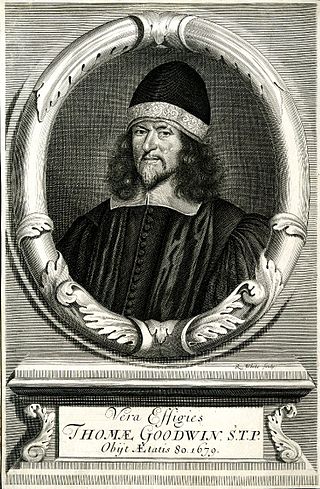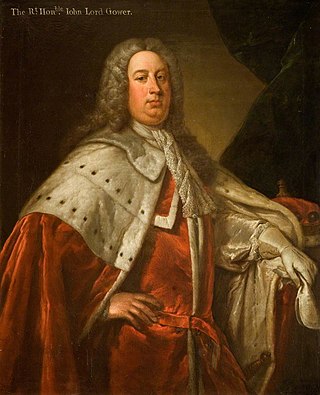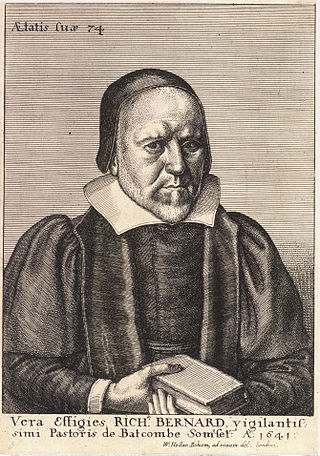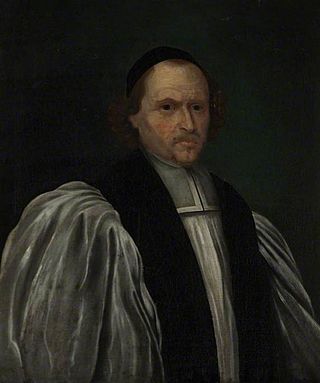Stanley Gower (possibly baptised 29 March 1600, died 1660) was a puritan minister in the Church of England. Notably he was one of the Westminster Divines.
In 1613 Gower became a pupil of the notable puritan minister Richard Rothwell who later on prepared Gower for university. In 1621 Gower went up to Trinity College Dublin, where he was elected a Scholar in 1621, and graduated with a Bachelor of Arts in 1625. [1] In 1630 he was appointed the curate of Attercliffe, remaining there until 1635. After a period in Hertfordshire, Gower went to London in 1643 [2] where he took part in the Westminster Assembly until 1649.
His son Humphrey Gower was born in 1638.

Peter Heylyn or Heylin was an English ecclesiastic and author of many polemical, historical, political and theological tracts. He incorporated his political concepts into his geographical books Microcosmus in 1621 and Cosmographie (1657).

Daniel Neal was an English historian.

Thomas Goodwin, known as "the Elder", was an English Puritan theologian and preacher, and an important leader of religious Independents. He served as chaplain to Oliver Cromwell, and was appointed by Parliament as President of Magdalen College, Oxford, in 1650. Christopher Hill places Goodwin in the "main stream of Puritan thought".

John Leveson-Gower, 1st Earl Gower, PC was an English Tory politician and peer who twice served as Lord Privy Seal from 1742 to 1743 and 1744 to 1754. Leveson-Gower also served in the Parliament of Great Britain, where he sat in the House of Lords as a leading member of the Tories, prior to switching his political affiliation and serving in various Whig-led government ministries until his death in 1754.
Thomas Edwards (1599–1647) was an English Puritan clergyman. He was a very influential preacher in London of the 1640s, and was a polemical writer, arguing from a conservative Presbyterian point of view against the Independents.
Sir Richard Grosvenor, 1st Baronet was an English politician who sat in the House of Commons at various times between 1621 and 1629. He is an ancestor of the modern day Dukes of Westminster.

Richard Bernard (1568–1641) was an English Puritan clergyman and writer.

Ralph Brownrigg or Brownrig (1592–1659) was bishop of Exeter from 1642 to 1646. He spent that time largely in exile from his see, which he perhaps never visited. He did find a position there for Seth Ward. He was both a Royalist in politics, and a Calvinist in religion, an unusual combination of the period. Brownrigg opposed Laudianism in Cambridge during the 1630s and at the Short Parliament Convocation of 1640. Nominated to the Westminster Assembly, he apparently took no part in it.

William Piers was Vice-Chancellor of Oxford University from 1621 to 1624, Bishop of Peterborough from 1630 to 1632 and Bishop of Bath and Wells from 1632 until the abolition of episcopacy in 1646, then again from the Restoration in 1660 to his death in 1670.

Sir Archibald Macdonald, 1st Baronet was a Scottish-born English lawyer, judge and politician.

William Gouge (1575–1653) was an English Puritan clergyman and author. He was a minister and preacher at St Ann Blackfriars for 45 years, from 1608, and a member of the Westminster Assembly from 1643.
Robert Crosse (1606–1683) was an English puritan theologian.
Robert Harris (1581–1658) was an English clergyman, known as a Puritan preacher, member of the Westminster Assembly, and President of Trinity College, Oxford.
Thomas Baylie (1582–1663) was an English clergyman, member of the Westminster Assembly, Fifth Monarchist and ejected minister.
John Ley was an English clergyman and member of the Westminster Assembly.
The dissenting academies were schools, colleges and seminaries run by English Dissenters, that is, those who did not conform to the Church of England. They formed a significant part of England's educational systems from the mid-seventeenth to nineteenth centuries.
Henry Tozer (1602–1650) was an English priest and academic, a Puritan of royalist views, elected to the Westminster Assembly but never sitting there.
Rathmell Academy was a Dissenting academy set up at Rathmell, North Yorkshire, and was the oldest non-conformist seat of learning in the north of England. The academy was established in 1670 by Richard Frankland M.A., 1670 and which was carried on, in spite of much persecution and many changes on venue of the academy, for nearly 30 years.
Theophilus Brabourne (1590–1662) was an English Puritan clergyman and theological writer on the Christian Sabbath.